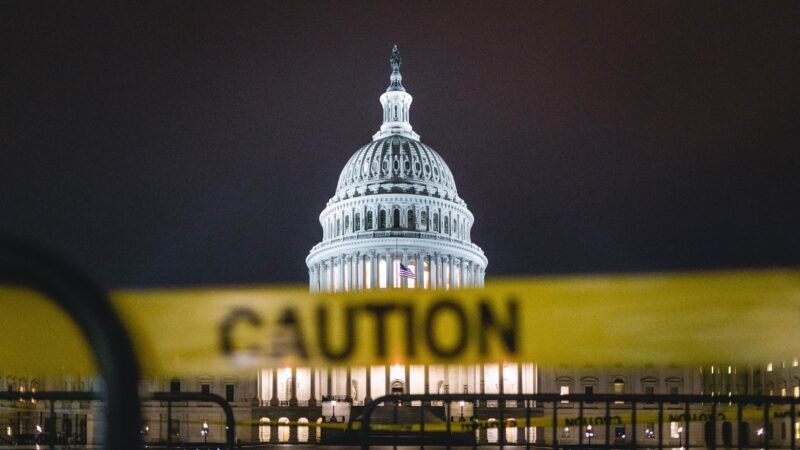Without Budget Gimmicks, Biden's 'Build Back Better' Will Add $3 Trillion to the Deficit, CBO Says
Enough with the budget gimmicks. It's time for Democrats to admit that Biden's proposal is a long, long way from being fully paid for.

President Joe Biden has repeatedly promised that his "Build Back Better" proposal will deliver "transformative" change for American society by greatly expanding the size of government to help defer the cost of child care, health care, and living in states with high taxes.
As that language would suggest, the president and his supporters in Congress see the massive domestic policy bill as a permanent reshaping of the relationship between individuals and the government. Something isn't "transformative" if it is fleeting.
Yet most of the bill, as currently written, is quite temporary. The extension of an expanded child tax credit—which pays parents up to $3,000 per child and is one of the most expensive elements of the plan—would technically last for just a single year. Other key elements in the package are set to expire after just three or five years. Biden's allies want his proposal to be compared to the New Deal or Great Society, but Social Security didn't vanish three years after it was created (whether it should have is a question we'll leave for another day).
Of course, no one really believes that the expanded child tax credit is going to disappear next year, either. As Reason has been pointing out over and over (and over and over) for the past several months, the expiration dates written into the "Build Back Better" plan are nothing but budget gimmicks meant to make the overall cost of the bill appear smaller than it really is.
On Friday, the Congressional Budget Office (CBO) finally confirmed what other analyses of the bill have found: If the provisions of the "Build Back Better" plan are made permanent, trillions of dollars in hidden costs will be added to the federal budget deficit. Strip away the budget gimmicks, and Biden's plan is not fully paid for—not even close.
In its official analysis of the bill, released last month, the CBO found that it would cost about $1.8 trillion and add about $367 billion to the deficit over the next decade. In response to a question submitted by Sen. Lindsey Graham (R–S.C.) about the budgetary effects if parts of the bill were made permanent, however, the CBO said Friday that the bill would "increase the deficit by $3.0 trillion."
That's in line with what independent assessments of the "Build Back Better" plan have also found.
The Committee for a Responsible Federal Budget (CRFB), a nonprofit that advocates for balanced budgets, projects that the plan will cost an estimated $4.8 trillion over 10 years if all provisions are made permanent—and that it would add about $2.8 trillion to the deficit.
A similar analysis conducted by the Wharton Budget Model, a number-crunching project housed at the University of Pennsylvania, found that the package would cost $4.6 trillion if its provisions were made permanent.
"Arbitrary expirations don't make policies cheaper, they just make them shorter—and sooner or later politicians will have to come to terms with how to address these new benefit cliffs," said Maya MacGuineas, president of the CRFB, on Friday in response to the new CBO analysis.
MacGuineas said Biden deserves credit for promising to pay for the cost of extending the temporary policies in the "Build Back Better" plan, but pointed out that those promises can only go so far. "It's impossible to predict the political situation in 2027, 2025, or even the end of 2022 as the chaotic schedule of expirations unfolds. And historic experience doesn't instill confidence—more often than not, extensions of expiring policies are added to the nation's credit card," she said.
Sen. Joe Manchin (D–W.Va.), a key holdout among Senate Democrats, has cited the budget gimmicks in the bill as a reason why he is opposed to voting for it. The CBO analysis requested by Graham seems like a fairly obvious attempt to influence Manchin—or, more accurately, to confirm what Manchin has already said he's worried about.
"If we're going to pick all these things we want to do, but one goes for three years, one goes for one year, and maybe one other one might go for the full 10 years," Manchin told reporters earlier this week. "Do they not intend for these programs to last for the full 10 years? Well, if they intend for that to happen, then what's the real cost?"
Now, he has his answer. It'll add $3 trillion to the deficit.


Show Comments (286)